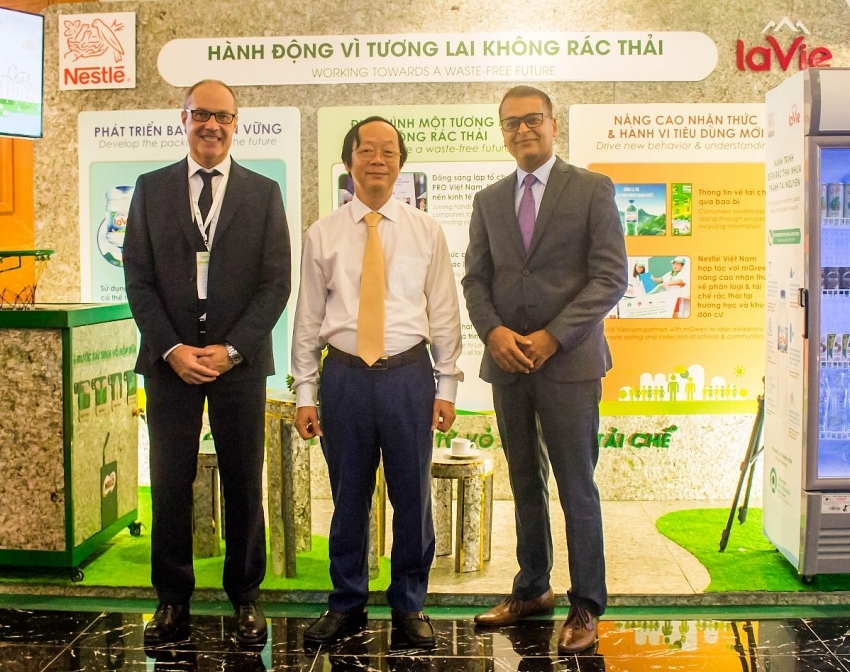Nestlé Vietnam and La Vie join forces for zero-waste future
 |
| Nestlé Vietnam CEO Binu Jacob (right), La Vie Vietnam CEO Fausto Tazzi (left) introduce to Vietnam's Deputy Minister of Natural Resources and Environment Vo Tuan Nhan (middle) diverse applications of recycled packaging |
Towards building a green, clean, and more beautiful Vietnam, Nestlé Vietnam and La Vie have teamed up with leading players in the consumer goods and packing industry to give birth to PRO Vietnam in June 2019 in an attempt to propel the circular economy format through facilitating a more accessible and sustainable collection and recycling of product packaging.
In the words of Binu Jacob – CEO of Nestlé Vietnam – the company has always attached its production and business activities with sustainable development and environmental protection targets.
“Leveraging an open co-operation with businesses on an equal footing and government agencies, as well as encouraging consumers to change the behaviour and habit of using plastic waste, Nestlé Vietnam wishes to play a part for a greener, cleaner, and more beautiful Vietnam,” said Jacob.
| In the face of global challenges from COVID-19 pandemic, Nestlé Group and members in diverse markets are joining efforts with local partners striving for quick economic recovery, simultaneously continuing their efforts for attainment of the ultimate goal of shaping a zero-waste future. |
Accordingly, Nestlé Vietnam, La Vie, and other members of Nestlé Group are taking a series of concrete actions to materialise the target of 100 per cent of their packaging could be recycled or re-used by 2025, along with the vision for a zero-waste future, focusing on three fields: developing sustainable packaging, shaping zero-waste future, and enhancing consciousness and new consumer behaviour.
Along with this, from early this year diverse instant milk products of Nestlé Vietnam, such as Nestlé MILO and Nestlé Nesvita have pioneered in using paper straws to save the environment, minimising the discharge of millions of plastic straws into the environment.
For La Vie Vietnam, numerous innovations in packaging have been deployed to reach the target all the packing could be recycled or re-used by 2025. The innovations include the company shifting into using lazer printing technology to minimise affecting the quality of plastics after recycling, or for the first time launching glass bottle, among others.
Aside with propping up the development of a circular economy in Vietnam, each year Nestlé Vietnam and La Vie have been actively deploying voluntary activities to clean up beaches, canals, and wet markets in locations across the country. These programmes feature the engagement of hundreds of company employees and volunteers at localities.
In the face of global challenges from the COVID-19 pandemic, Nestlé Group and members in diverse markets are joining efforts with their local partners striving for quick economic recovery, simultaneously continuing their efforts for attainment of the ultimate goal of shaping a zero-waste future.
What the stars mean:
★ Poor ★ ★ Promising ★★★ Good ★★★★ Very good ★★★★★ Exceptional
Related Contents
Latest News
More News
- Trung Nam-Sideros River consortium wins bid for LNG venture (January 30, 2026 | 11:16)
- Vietnam moves towards market-based fuel management with E10 rollout (January 30, 2026 | 11:10)
- Envision Energy, REE Group partner on 128MW wind projects (January 30, 2026 | 10:58)
- Vingroup consults on carbon credits for electric vehicle charging network (January 28, 2026 | 11:04)
- Bac Ai Pumped Storage Hydropower Plant to enter peak construction phase (January 27, 2026 | 08:00)
- ASEAN could scale up sustainable aviation fuel by 2050 (January 24, 2026 | 10:19)
- 64,000 hectares of sea allocated for offshore wind surveys (January 22, 2026 | 20:23)
- EVN secures financing for Quang Trach II LNG power plant (January 17, 2026 | 15:55)
- PC1 teams up with DENZAI on regional wind projects (January 16, 2026 | 21:18)
- Innovation and ESG practices drive green transition in the digital era (January 16, 2026 | 16:51)

 Tag:
Tag:


























 Mobile Version
Mobile Version